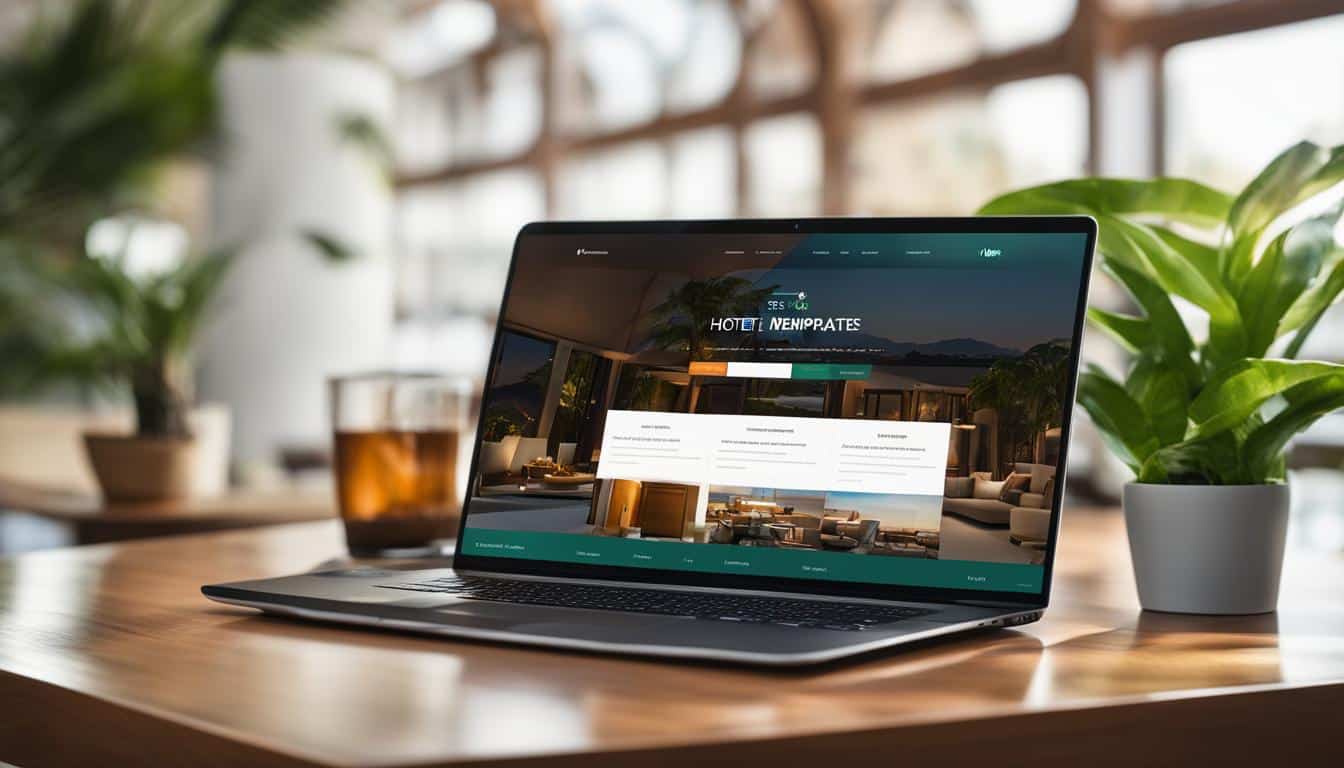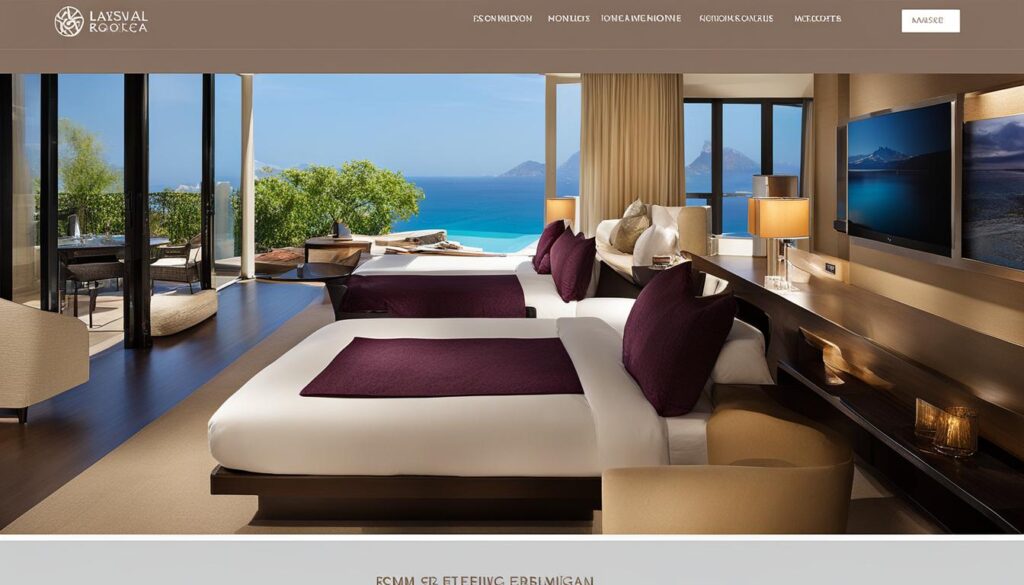
When it comes to creating a captivating online presence for your hotel, choosing the right website template is crucial. A well-designed and functional template can make all the difference in attracting potential guests and driving bookings. In this article, I'll explore the best hotel website templates available, focusing on their responsiveness, customization options, and modern design. Whether you're using platforms like WordPress, Joomla, Drupal, or online website builders like Wix, I'll help you find the perfect template to showcase your hotel in the best possible light.
Before we dive into the details, let's take a look at the key takeaways:
- Choose a responsive hotel website template to ensure your site looks great on all devices.
- Consider customization options to tailor the template to your hotel's brand and style.
- Opt for a modern design that creates a positive first impression on visitors.
Creative and Functional Design for an Impressive User Experience
When it comes to creating an exceptional online presence for your hotel, choosing the right website template is crucial. A professional and modern design can make a lasting impression on potential guests, enticing them to explore your offerings further. With the increasing number of people using mobile devices to browse and book hotels, it's essential to opt for mobile-friendly templates that adapt seamlessly to different screen sizes.
Not only should the templates be visually appealing, but they should also be easy to use and customize. As a hotel owner, you want to be able to update content, manage bookings, and showcase your unique features effortlessly. Look for templates that offer user-friendly interfaces, intuitive navigation, and options for customization without the need for extensive coding knowledge.

"A well-designed website creates a sense of trust and professionalism, making potential guests more likely to book their stay."
Creating a Memorable First Impression
A visually striking website can captivate visitors from the moment they land on your homepage. Make sure the templates you consider provide stunning graphics, high-quality images, and engaging layouts that reflect the ambiance and character of your hotel. Incorporating features such as image sliders, video backgrounds, and interactive maps can further enhance the user experience and set your hotel apart from the competition.
Optimizing for User-Friendly Booking
One of the most critical aspects of a hotel website is the booking system. A user-friendly and reliable reservation system not only simplifies the booking process for your guests but also ensures efficient management of room availability, avoiding overbooking. Look for templates that offer seamless integration with popular booking platforms or provide built-in booking functionality, allowing guests to make reservations directly through your website.
| Key Features | Description |
|---|---|
| Mobile-Friendly Design | Ensures an optimal browsing experience on all devices. |
| Easy Customization | Allows you to personalize the website according to your branding. |
| High-Quality Visuals | Engaging images and videos that showcase your hotel's unique features. |
| User-Friendly Booking System | Simplifies the reservation process and integrates with your management system. |
By selecting a professional hotel website template with a creative and functional design, you can create an impressive user experience that drives engagement and encourages bookings. Remember to prioritize a mobile-friendly interface, easy customization options, and a user-friendly booking system to maximize the effectiveness of your hotel website.
Essential Features for an Effective Hotel Website
When it comes to creating a successful hotel website, certain essential features are key to attracting potential guests and providing them with a seamless user experience. In this section, we will explore the must-have components that every hotel website template should offer.
1. User-Friendly Booking System
A user-friendly booking system is crucial for any hotel website. It should seamlessly integrate with the hotel's management system to avoid any issues with overbooking or miscommunication. The booking system should be intuitive and easy to navigate for guests, allowing them to quickly select their desired dates, room type, and any additional services or amenities they may require.
2. Room Descriptions, Rates, and Services
A successful hotel website should provide detailed room descriptions, rates, and services to give potential guests a clear understanding of what they can expect during their stay. Each room type should have its own dedicated page with vivid descriptions, high-quality images, and a list of included amenities. The rates should be clearly displayed, along with any current promotions or special offers, to entice visitors to make a reservation.
3. Gallery or Virtual Tour
A visually engaging hotel website should have a gallery or virtual tour to showcase the hotel's amenities, rooms, and surrounding areas. High-resolution images and interactive virtual tours allow potential guests to get a real sense of the hotel's ambiance and help them visualize their experience. This feature is particularly effective in capturing the attention of and building trust with potential guests.
4. Customer Reviews and Ratings
To establish credibility and build trust with potential guests, it is essential to display customer reviews and ratings on the hotel website. Positive reviews and high ratings act as social proof, assuring visitors of the hotel's quality and service. Integrating a review platform or embedding testimonials directly on the website can greatly influence a visitor's decision to book a stay.
5. SEO Optimization
Lastly, a well-designed hotel website template should be SEO optimized to improve its visibility in search engine results. This involves implementing relevant keywords, optimizing meta tags, and ensuring the website's structure and content adhere to SEO best practices. A higher ranking in search results can lead to increased organic traffic and ultimately more bookings.

By incorporating these essential features into your hotel website template, you can create a compelling online presence that attracts potential guests and encourages them to book their stay. Remember, a user-friendly booking system, detailed room descriptions and rates, visually captivating galleries or virtual tours, customer reviews and ratings, and SEO optimization are all vital components to consider when selecting the perfect hotel website template.
Conclusion
In conclusion, when choosing a hotel website template, it is important to consider the range of options available on different platforms such as WordPress, Joomla, Drupal, Wix, and simple HTML templates. WordPress offers the most extensive selection of hotel website templates, providing hotel owners with a wide array of designs and functionalities to choose from. On the other hand, Joomla and Drupal have limited options when it comes to hotel templates, making them less suitable for creating a standout online presence for hotels.
For those looking for simplicity and ease of use, online website builders like Wix and simple HTML templates can be viable alternatives. These platforms offer user-friendly interfaces and customizable templates that allow hotel owners to create a professional and modern website without the need for advanced technical skills.
Regardless of the platform chosen, the selected hotel website template should have a professional and modern design. It should be mobile-friendly to cater to the increasing number of users browsing the web on their smartphones. Additionally, the template should be easy to use and customize, empowering hotel owners to update content, manage bookings, and personalize their website according to their brand's identity.
Moreover, essential features such as a user-friendly booking system, room descriptions, rates, and services, as well as customer reviews and ratings, are crucial elements that should be included in the hotel website template. These features contribute to providing a seamless user experience, building trust with potential guests, and ultimately boosting bookings.
Lastly, it is essential that the chosen hotel website template is SEO optimized. This ensures that the website is visible to search engines and appears in relevant search results, increasing its chances of attracting organic traffic. By selecting a template that incorporates all these factors, hotel owners can create a stunning online presence that impresses guests and drives business growth.
FAQ
Can I use hotel website templates on any platform?
Yes, hotel website templates can be used on various platforms, including WordPress, Joomla, Drupal, Wix, and even simple HTML templates.
Are there different types of hotel website templates available?
Yes, there are different types of hotel website templates available, offering a range of design styles and features to suit different hotel businesses.
Can I customize hotel website templates to match my brand?
Yes, most hotel website templates are customizable, allowing you to add your logo, change colors, and customize the layout to match your brand identity.
How important is mobile-friendliness for hotel website templates?
Mobile-friendliness is extremely important for hotel website templates, as more and more people are using their smartphones to search and book hotels online.
What essential features should hotel website templates have?
Hotel website templates should have essential features such as a user-friendly booking system, room descriptions, rates, services, a gallery or virtual tour, and customer reviews and ratings.
Can hotel website templates improve my website's visibility in search engines?
Yes, by choosing SEO optimized hotel website templates, you can enhance your website's chances of ranking higher in search engine results and attracting more organic traffic.
Are hotel website templates easy to update and manage?
Yes, hotel website templates are designed to be user-friendly, allowing hotel owners to easily update content, manage bookings, and make changes without the need for technical expertise.











